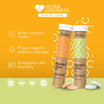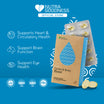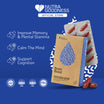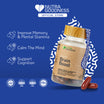1. Heart Disease
Heart Disease is the leading cause of death worldwide, affecting both genders. It includes coronary artery disease, heart attacks and heart failure. Risk factors include high blood pressure, high cholesterol, smoking, obesity, and lack of physical activity. Study have shown that one in five Singaporeans have one or more risk factors for cardiovascular disease. Men tend to experience heart disease at an earlier age than women. For women, the risk increases after menopause due to a decline in oestrogen levels.
2. Cancer
Cancer encompasses a wide range of diseases characterized by uncontrolled cell growth. The most common types of cancer include breast, lung, prostate, and colorectal cancer. Risk factors include genetics, environmental exposures (such as smoking or radiation), and lifestyle factors like diet and physical activity. Between 2018 and 2022, Singapore reported a total of 87,716 cases of cancer, with men accounting for 49% and women for 51%. Among men, prostate cancer was the most common, comprising 17.4% of all male cancer cases. For women, breast cancer was the most prevalent, making up 29.6% of all female cancer cases.

Adapted from National Cancer Centre Singapore <Cancer Statistics>, date referred: November 2024
3. Type 2 Diabetes
Type 2 diabetes occurs when the body becomes resistant to insulin or when the pancreas cannot produce enough insulin. Poor diet, obesity, physical inactivity, and a family history of diabetes increase the risk of developing the disease. It can lead to complications such as heart disease, kidney failure, and nerve damage. Women are at higher risk for diabetes after menopause. In 2021, the prevalence of diabetes in Singapore was found to be 14.9%.
4. Obesity
Obesity is a major risk factor for many other health conditions, including diabetes, heart disease, and certain cancers. It is typically caused by a combination of genetic, environmental, and lifestyle factors such as poor diet and lack of exercise. An estimated 1 in 9 (11.6%) Singapore residents aged 18 to 74 were obese during 2021-2022. Obesity was more prevalent among men (13.1%) than women (10.2%). Men tend to have a higher percentage of visceral fat, which is particularly harmful to cardiovascular health, while women are more likely to develop obesity-related conditions such as osteoporosis or polycystic ovary syndrome (PCOS).
Wong FY, Lee CM, Chua AV, Chia KL, Angela Koh, Chen XY & Sarah Tan, 2023, National Population Health Survey 2022
5. Stroke
A stroke occurs when blood flow to the brain is interrupted, either by a blockage (ischemic stroke) or by bleeding (hemorrhagic stroke). Risk factors include high blood pressure, high cholesterol, smoking, obesity, and diabetes. Stroke is the fourth leading cause of death in Singapore, accounting for 6.8% of all deaths, and is the seventh leading cause of disability among adults. Men tend to have strokes at earlier age while women experience stroke later in life. Hormonal changes can increase stroke risk in women.
Venketasubramanian N, Chen CL. Burden of stroke in Singapore. Int J Stroke. 2008
6. Mental Health Disorders
Mental health issues such as depression, anxiety, and stress can significantly impact overall health. These disorders can be caused by a combination of genetic, environmental, and psychological factors. In 2020, the prevalence of poor mental health among Singapore residents was 13.4%, with women experiencing a higher rate of 14.8% compared to men at 12%. Women are more likely to experience depression and anxiety, often linked to hormonal changes.
7. Chronic Respiratory Diseases
Chronic obstructive pulmonary disease (COPD) is a group of lung diseases that black airflow and make it difficult to breathe. Men has higher risk than women.
8. Kidney Disease
Chronic Kidney Disease can occur when kidneys are damaged and cannot filter waste from blood effectively. It can be caused by diabetes, high blood pressure, and other chronic conditions. Men are at higher risk and tend to develop at earlier age compared to women.
9. Osteoporosis
Osteoporosis is a condition in which the bones become weak and brittle, increasing the risk of fractures. It is more common in women, especially after menopause, due to the decrease in oestrogen, a hormone that helps maintain bone density. Women are at a much higher risk compared to men, especially after menopause. Osteoporosis risk is higher due to low calcium intake, prolonged immobility, heavy alcohol consumption, cigarette smoking, low vitamin D intake and/or low muscle mass.
10. Autoimmune Diseases
Autoimmune diseases occur when the body's immune system mistakenly attacks healthy cells. Conditions such as lupus, rheumatoid arthritis, and multiple sclerosis are more common in women. The exact cause of autoimmune diseases is unknown, but they may be influenced by genetic and hormonal factors. Women are more likely to develop autoimmune diseases than men, with conditions like lupus being more prevalent in women of childbearing age.
Understanding the common health risks faced by men and women is essential for taking proactive measures to prevent or manage these conditions. Regular checkups, healthy lifestyle choices, and staying informed about the specific risks for each gender can help improve overall well-being and longevity. Gender differences in health risks underscore the need for tailored health strategies that address the unique needs of men and women. Nutra Goodness offers a range of supplements specially curated to meet the unique needs of both men and women for everyday wellness. Afterall, prevention is better than cure.
References:
1. Asst. Prof. Yeo Tee Joo, n.d, Prevention Programme for Heart Disease, National University Heart Centre Singapore, < Prevention Programme for Heart Disease - NUHCS | National University Heart Centre, Singapore>, date referred: 20 November 2024
2. National Cancer Centre Singapore, 30 Oct 2024, Cancer Statistics, <Cancer Statistics>, date referred: 20 November 2024
3. International Diabetes Federation, n.d, Diabetes in Singapore (2021), <Singapore - International Diabetes Federation>, date referred: 20 November 2024
4. Wong FY, Lee CM, Chua AV, Chia KL, Angela Koh, Chen XY & Sarah Tan, 2023, National Population Health Survey 2022 <nphs-2022-survey-report_final.pdf>, date referred: 20 November 2024
5. Venketasubramanian N, Chen CL. Burden of stroke in Singapore. Int J Stroke. 2008
6. Lee CM, Daniel Lin, Wong WX, 2022, Statistics Singapore News Letter Issue 1, Key Highlights from National Population Health Survey 2020 < Singapore Department of Statistics | Statistics Singapore Newsletter Issue 1, 2022 - Key Highlights from the National Population Health Survey 2020>, date referred: 20 November 2024




















![[Mix & Match] Nutra Goodness NutraAroma Pure Essential Oil 30ml - Peppermint/Lime/Ginger/Tea Tree](http://www.nutragoodness.com/cdn/shop/files/Nutra_Goodness_product_listing_nutra_aroma_mix_2c7cc02f-396c-461e-ad46-0c5f010e5a60.jpg?v=1737706140&width=104)












